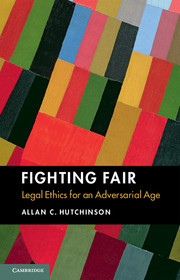3 - A Theoretical Excursion
Published online by Cambridge University Press: 05 August 2015
Summary
In a prevailing climate of ethical ambivalence and professional indifference, it is not surprising that there are increasingly urgent calls for action. There are insistent demands for a more ethical practice of law as well as a more compelling theoretical account of legal ethics. In short, the legal profession is being asked to put its ethical money where its professional mouths is. An important and revealing attempt to do this is Bradley Wendel's Lawyers and Fidelity to Law. In a state-of-the-art and superior example of existing scholarship on legal ethics, the book offers itself as an ambitious effort to ‘bridge the gap between academic philosophy (moral, political, and legal) … and the circumstances of actual practicing lawyers’ and to provide a justificatory account of legal ethics that is ‘about political legitimacy, not justice or ordinary morality’. However, like most defenses of traditional approaches to legal ethics, Wendel's actual performance is exceeded by his general ambition. As such, its goal and its recommendations are emblematic of the general failure of contemporary thinking about legal ethics and professional responsibility.
In his acclaimed scholarship, Wendel has not so much offered a new approach to legal ethics as offered an apologia for extant professional practices. The fact that he has done so with jurisprudential sophistication and technical subtlety merely compounds the offense. His extended analysis manages to reveal, not retrieve the parlous state of legal ethics. Consequently, in examining Wendel's work, I offer two series of challenges to his justificatory theory of legal ethics – the first is jurisprudential and will expose the theoretical footings and failings of his account; the second is more practical and will look to its troubling implications for professional practice. In so doing, my critical focus will also be twofold – to demonstrate the limitations of present thinking and to suggest how best to move forward the debate about the relationship between law, justice and legal ethics. As the best and most celebrated piece of theoretical reflection in the area, Wendel's account is the perfect target for a critique of both the theory and practice of legal ethics. So goes Wendel, so goes contemporary scholarship.
- Type
- Chapter
- Information
- Fighting FairLegal Ethics for an Adversarial Age, pp. 21 - 37Publisher: Cambridge University PressPrint publication year: 2015



